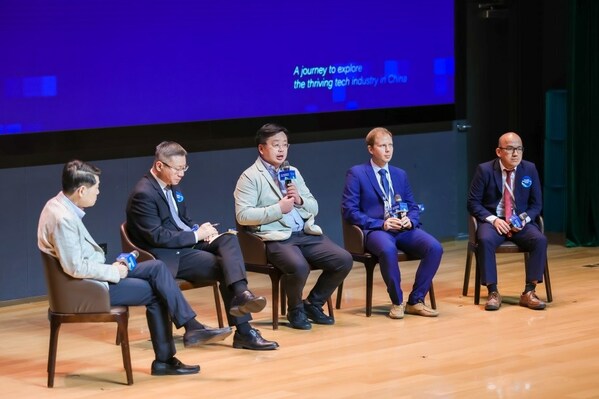BEIJING, March 5, 2024 /PRNewswire/ — A news report from Beijing Review:
Clarence Ling Chun-kit, Director of Hong Kong Special Administrative Region-based Kwai Hung Realty Co. Ltd., is a member of the 14th National Committee of the Chinese People’s Political Consultative Conference (CPPCC), China’s top political advisory body.
Clarence Ling Chun-kit (center) attends a global youth forum organized by Beijing Review in Beijing on June 20, 2023 (COURTESY PHOTO)
“I’ve submitted two proposals this year. One is about fully utilizing Hong Kong’s unique role in attracting foreign students to study in China. The other one is more specific, focusing on leveraging Hong Kong’s policy advantages to accelerate the approval process for prescription drugs and medical devices manufactured in the mainland,” Ling told Beijing Review right before the opening of the CPPCC National Committee’s annual session on March 4.
But, he added, the two proposals share a common core: Hong Kong’s future lies in how it can apply its uniqueness to the development of the country as a whole. And it’s the responsibility and the mission of Hong Kong people to make sure of that.
When it comes to communicating and submitting proposals, the consultation process has a considerable degree of freedom, Ling explained. CPPCC National Committee members have the right to ask the committee to convey their ideas to the Central Government.
According to Ling, every time a CPPCC member discovers a problem and presents it through the appropriate CPPCC channels, the government will try its best to find a solution and respond in a timely manner. Over the decades, this system has been continuously fine-tuned and solutions are improving.
“I think this is the most rewarding part of my work with the CPPCC,” Ling said.
Last year was the first year of his five-year term serving as a CPPCC member. Ling put forward proposals to increase convenience for Hong Kong residents living in the mainland and optimize related management, such as offering more accessible tax payment methods.
Following extensive rounds of internal assessment, the suggestions generated clear responses and concrete results.
“On the surface, proposals are suggestions, but there are very strict requirements: The research data should be well documented, the suggestions put forward should be substantial, the problems targeted should be realistic, and the solutions should be both practical and feasible,” Ling said. This is what drives CPPCC members to go into the field personally and gather first-hand information.
According to Ling, the proposals he submitted last year were all based on his own personal experiences taking planes and trains, checking into hotels and going to banks in the mainland. A youth entrepreneurship center in which he had personally invested provided much of the data on entrepreneurship.
“Another very important task in the work of the CPPCC is study,” he said. China is a vast place with a very diverse demographic. Attending meetings and discussions to learn about the country’s system and get information that cannot be found in books can help members understand their country from different perspectives.
“One could say that when CPPCC National Committee members gathered in Beijing for their annual session, they are representatives of the people, and when they leave the capital city, they are messengers who are responsible for delivering the latest information to the most remote corners of the country,” Ling said, adding that if someone wants to understand the workings of the CPPCC, they should start by grasping China’s vastness and complexity.
Hong Kong returned to China in 1997, after having been under British colonial rule since the mid-19th century. Under the One Country, Two Systems policy, Hong Kong retains its own social and economic systems on the premise that there is only one China.
As a “super connector” between the mainland and Hong Kong, Ling has been involved in youth work for over a decade.
“I’ve been committed to helping young people in the Guangdong-Hong Kong-Macao Greater Bay Area to find suitable career paths and entrepreneurial projects for a long time. And, of course, Hong Kong’s local youth are an important part of it,” Ling said. The Greater Bay Area refers to the city cluster in south China’s Pearl River Delta consisting of Hong Kong and Macao special administrative regions and nine cities of Guangdong Province.
In February, Ling established a new organization called the Chinese Young Entrepreneurs Association in Hong Kong. “We aim to fully leverage Hong Kong’s role as an important bridge between the country and the international community to promote trade, investment and communication among young entrepreneurs, both domestically and internationally,” he explained.
View original content to download multimedia: Read More
